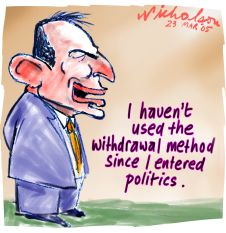Search
Democracy Links
Member's Off-site Blogs
dopus dei .....
from Crikey.....
Canberra correspondent Bernard Keane writes:
Abbott's Catholicism fair game
One allegation I'd never thought I'd make about Tony Abbott is that of being a sook. The bloke loves a stoush and has always seemed to readily understand that if you dish it out, you have to be prepared to take it.
Which meant it was a bit odd yesterday when, being interviewed by Laurie Oakes for the first time as Opposition leader, Abbott got upset about being asked his views on evolution. Abbott responded by demanding to know why Oakes had never asked Kevin Rudd the same question. "I don't want to turn it into a religious inquisition either, Laurie," Abbott said, declaring his views "personal" and "not there in the political market place".
You can understand why Abbott is suddenly anxious not to talk about religion. The government is painting him as a right-wing extremist, and continued focus on his militant Catholicism plays directly to that. He doesn't help himself when he reflexively makes statements declaring that he doesn't have "theological views" on issues, but he can control that with a bit of discipline. It will be harder if the media keeps raising religion with him.
Abbott's complaint that Rudd is not asked the same question is disingenuous. Rudd might be a socially conservative Christian but does not use his public office to impose his religious views. He elected not to intervene when caucus decided the government should lift the long-standing Howard government ban on foreign aid for abortion, introduced at the behest of the abortion-obsessed Brian Harradine. In fact, Rudd specifically commended caucus on the way it had handled the debate, noting his own view was one of support for the status quo.
Abbott, in contrast, specifically linked his ministerial office with the pursuit of what he called "the epidemic of abortion". In a remarkable speech to a Catholic conference in 2005, he urged Catholics to mobilise against abortion. "It seems to me undeniable that we have a terrible problem in this country. There are about 75,000 Medicare-funded abortions every year," Abbott told the group. At the end of the previous year, Abbott's right-wing colleague Eric Abetz had called for the ending of Medicare funding for abortion. Abbott also specifically criticised Catholics who complained about children in detention instead of attacking abortion.
I respectfully put it to church leaders that if, on a per capita basis, Catholics devoted as much moral energy to these 100,000 extinguished lives as we do to the far smaller number of children in detention, if senior Catholics were as morally indignant about the unambiguous moral tragedy of abortion as we are about the less clear-cut question of immigration detention, then there would be change.
Abbott has no basis on which to complain when the media discusses his Catholicism and its policy implications, particularly not when he himself so aggressively called on the Catholic Church to specifically press for change to Medicare funding of abortion, which he believed a far greater "moral tragedy" than the detention of children.
As we now know, Abbott's campaign on abortion turned into a disaster when Lyn Allison joined with like-minded female Liberal, Labor and Green MPs and senators to overturn the ban on RU-486 (another Harradine bequest) despite efforts by Abbott to manipulate the debate.
It's an interesting contrast to his predecessor. Several people have expressed surprise when I told them recently Malcolm Turnbull is a committed Catholic. The difference is that Turnbull has never let his religion interfere with his public life. He voted in support of the RU-486 amendments (along with Rudd, Joe Hockey and several Catholic MPs from both sides). He addressed the Australian Christian Lobby last year, was applauded when he spoke of how important his faith was to him, but then boldly told them he supported women's right to choose.
Defenders of Abbott have long argued that any questioning of Abbott's religious views is automatically some form of sectarianism. Abbott himself from time to time has complained of "a new sectarianism". On the contrary, political figures on all sides routinely show that a strong religious faith need not impinge on their public duties. It is Abbott himself who has placed his faith on the political agenda through his own actions. That won't change just because he now finds being asked about religion politically inconvenient.
With Abbott's front bench likely to be filled with Catholic conservatives and anti-abortion hardliners such as Barnaby Joyce and Kevin Andrews (and veteran feminist Helen Coonan gone to the back bench), the issue is more relevant than ever.
- By John Richardson at 7 Dec 2009 - 7:53pm
- John Richardson's blog
- Login or register to post comments

Recent comments
51 min 4 sec ago
52 min 27 sec ago
1 hour 58 min ago
5 hours 18 min ago
12 hours 41 min ago
13 hours 14 min ago
13 hours 36 min ago
13 hours 55 min ago
14 hours 6 min ago
1 day 2 hours ago